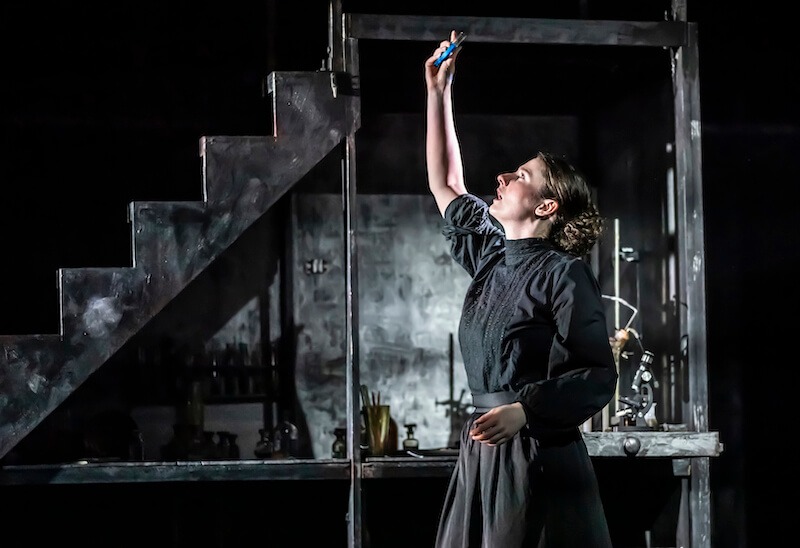Charing Cross Theatre – until 28 July 2024
Reviewed by Julia Spargo
3***
Maria Sklowdowska leaves her native Poland by train to study at the Sorbonne university in Paris. On the train she meets Anne Kowalska (the beautifully expressive Chrissie Bhuma), a fellow Polish woman, who is due to work in Paris in order to make a better life for herself when she returns to her native Poland. The two become friends, Maria telling Anne of her dreams to fill in the periodic table, since she is sure there are elements still waiting to be discovered. Anne makes Maria promise that she will fulfill her destiny to “put Poland on the map” and the two remain in touch over the years.
As the only female studying at the Sorbonne, Maria encounters prejudice and misogyny, but her academic life changes when she meets the French physicist Pierre Curie and begins working with him.
The discovery of radium opens the doors for incredible medical advances, but at the time its properties and consequences are not fully understood, and it was used all over Paris for everything from lighting to cosmetics. This is highlighted in Marie Curie by the fictional story of Polish workers in a radium factory, one of whom is Anne, who in turn fall victim to radium poisoning and die as a result. Maria, by now Marie Sklowdowska-Curie since she has married Pierre, is forced to confront the potential for medical progress in contrast to the reality of people dying from exposure to radium, including her best friend Anne.
The story of Marie Curie does not form the basis of a cheery musical, but the first half is a fast-paced exploration of the resilience of a foreign woman in the male-dominated academic world of science. Ailsa Davidson gives a strong performance as the determined Marie, obsessed with her work and the potential radium (when she discovers it) may hold. Clever use of lighting highlights her tenacity, illuminating the back of the set with notes from Marie’s experiments in her own handwriting, showing just how many times she repeated the same experiment. The set is simple but used to good effect and moved around by the cast during the play with no disruption to the pace of the story (the musical is 1 hour 40 minutes and runs straight through). The score is solid, performed with gusto by the cast and cleverly thread throughout the performance, the song Unpredictable, Unidentified reprised with new meaning at the end. For a musical celebrating a woman’s triumph in the face of misogyny and dismissal by men, it makes sense that the strongest performances are by the female cast members.
As the factory workers fall victim, the musical takes a somewhat macabre turn and despite effective use of back-lighting and choreography to depict their fate, songs about necrosis and autopsy results were graphic and went on for too long, losing the grip of the audience and making for an uncomfortable middle of the musical, from which I felt it never recovered.
Marie Curie is a valuable history lesson, a confronting story of the human cost of medical advances which could lead to lively debate and, in my case, further research in my efforts to separate the scientific facts from the narrative fiction. Marie Curie changed the world and this musical celebrates that fact without diminishing the harsh realities, but I was strangely unmoved.

